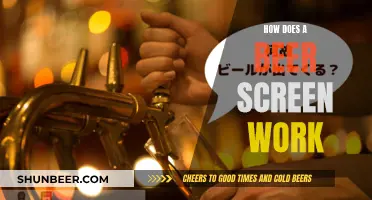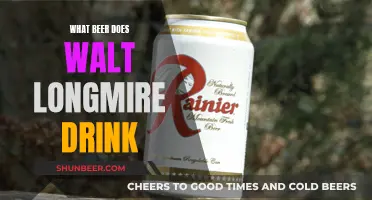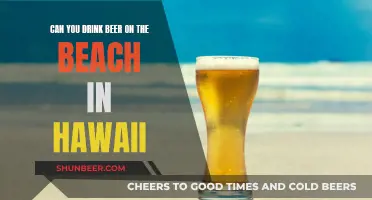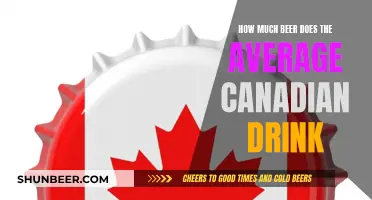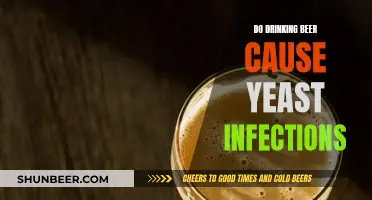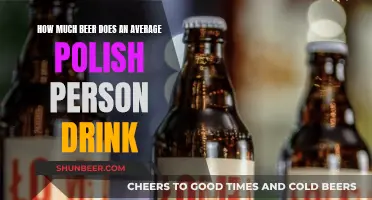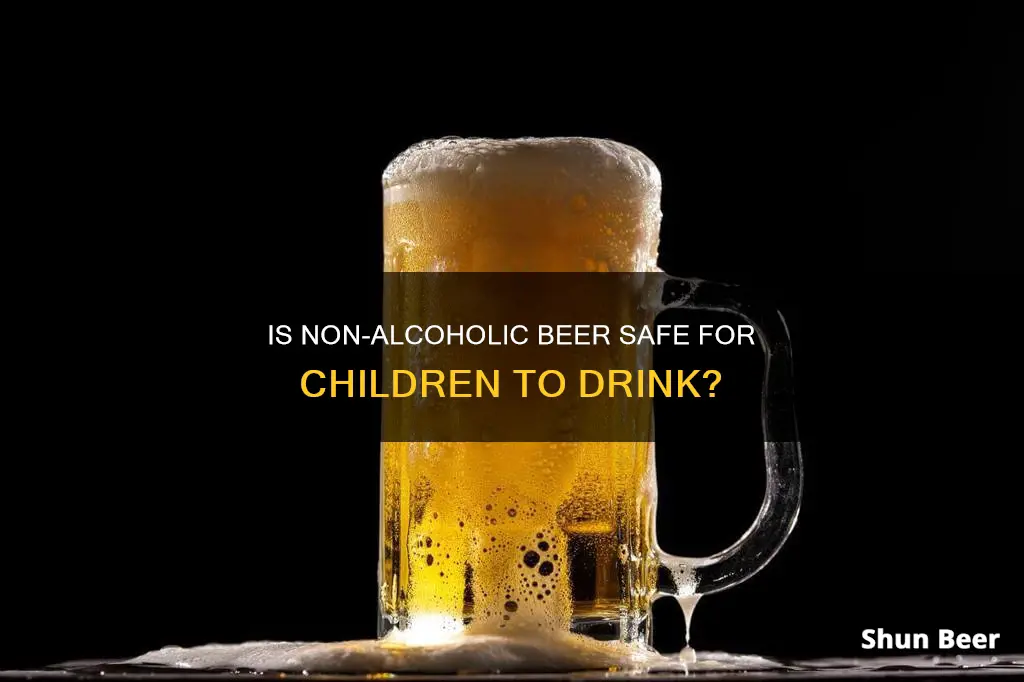
In the UK, non-alcoholic drinks are often treated the same as alcoholic drinks by pubs, bars, and shops. This means that non-alcoholic beer may not be served to minors, even though drinks under 0.5% ABV are not legally considered alcohol. This is done to avoid promoting alcohol to children and to make it easier to enforce rules regarding alcoholic drinks. Actress Kristen Bell has revealed that her children, aged 8 and 9, drink non-alcoholic beer, which has sparked a conversation about the legality and appropriateness of minors consuming these beverages. While the legal drinking age in the UK is 18, it is up to parents and guardians to decide whether to allow their children to drink non-alcoholic beer.
What You'll Learn
- Non-alcoholic beer may contain trace amounts of alcohol
- UK law does not define drinks under 0.5% ABV as alcohol
- Retailers restrict sale of non-alcoholic beer to minors to avoid promoting alcohol to children
- Retailers restrict sale of non-alcoholic beer to minors to make it easier to enforce rules regarding alcoholic drinks
- Some US states only allow non-alcoholic beer consumption for those 18 and older

Non-alcoholic beer may contain trace amounts of alcohol
In the UK, non-alcoholic beer is not subject to the same restrictions as alcoholic drinks if they are under 0.5% ABV. This is because they are not legally considered "alcohol" under the Licensing Act 2003. However, despite non-alcoholic beer containing only trace amounts of alcohol, pubs, bars, and retailers often treat it the same as alcoholic drinks. This is mainly to avoid promoting alcohol to children and to make it easier to enforce rules regarding alcoholic drinks.
The corporate arm of Budweiser and Beck's, AB-Inbev, and the Portman Group, a UK trade group of alcoholic drinks producers, have publicly available policies about the promotion and sale of non-alcoholic drinks to minors. AB-Inbev's Responsible Marketing and Communications Code (RMCC) covers alcohol-free and non-alcoholic beer products. The Portman Group's voluntary Code of Practice on the Responsible Naming, Packaging and Promotion of Alcoholic Drinks also applies to non-alcoholic products.
Retailers such as Tesco, Waitrose, and Co-op have also stated that they voluntarily restrict the sale of non-alcoholic drinks to minors. This is to avoid promoting alcohol-like products to underage customers and to protect children from the dangers of alcohol. For example, a spokesperson for Co-op said:
> "As a responsible retailer, we voluntarily restrict the sale of non-alcoholic drink products that resemble beer, wine, or spirits. We do not want to give the impression to customers that people under 18 are being permitted to purchase products that contain alcohol."
Similarly, pubs and bars may find it difficult to distinguish between customers drinking alcoholic and non-alcoholic products. For example, the UK's Wetherspoon pub company does not sell alcohol-free beer to minors as staff may struggle to differentiate between the two.
While non-alcoholic beer may be legally served to minors in the UK, some pubs, bars, and retailers may still choose to restrict its sale to those under the legal drinking age. This is to avoid promoting alcohol to children and to simplify the enforcement of rules regarding alcoholic drinks.
Beer Traps: Effective Snail Control or Urban Myth?
You may want to see also

UK law does not define drinks under 0.5% ABV as alcohol
In the UK, drinks under 0.5% ABV are not restricted by alcohol licensing, meaning anyone can buy and sell these drinks without the need for an alcohol license. This is because the Licensing Act 2003 defines "alcohol" as beer, wine, cider, spirits, and other liquors over 0.5% ABV. As a result, a drink of 0.5% ABV or below is not classed as alcohol, and relevant underage sale offences do not apply.
However, it is important to note that UK food labelling regulations state that only drinks under 0.05% ABV can be described as "alcohol-free". The term "non-alcoholic" cannot be used with drinks commonly associated with alcohol, such as beer and wine, unless it is unfermented grape juice labelled as "non-alcoholic wine". Drinks up to 0.5% ABV can be labelled as "de-alcoholised" if they have had the alcohol removed after fermentation.
Despite the legal threshold, there is ongoing debate about the appropriate labelling of low-alcohol drinks. Some argue that the UK's definition of "alcohol-free" should be raised to 0.5% ABV to align with other countries and provide clarity for consumers. Others advocate for maintaining the distinction at 0.05% ABV, emphasising transparency, ethical concerns, and potential health risks for vulnerable individuals.
While the legal threshold for "alcohol-free" drinks in the UK is currently set at 0.05% ABV, the government has been consulting on new regulations for low-alcohol drink labelling, indicating a potential shift in the classification of these beverages.
Americans' Beer Consumption: How Much is Too Much?
You may want to see also

Retailers restrict sale of non-alcoholic beer to minors to avoid promoting alcohol to children
In the UK, drinks under 0.5% ABV aren't legally considered "alcohol" and aren't subject to the same restrictions as alcoholic drinks. However, retailers often treat alcohol-free beer the same as alcoholic drinks to avoid promoting alcohol to children and to make it easier to enforce rules regarding alcoholic drinks.
The packaging and appearance of alcohol-free beer are almost indistinguishable from alcoholic beer. Allowing minors to buy alcohol-free beer could indirectly promote similar products that contain alcohol. This is especially true when the alcohol-free beer is produced by companies that also produce alcoholic drinks.
Retailers such as Tesco, Waitrose, and Co-op have policies in place to restrict the sale of non-alcoholic drinks that resemble beer, wine, or spirits to minors. They do not want to give the impression that people under 18 are permitted to purchase products that contain alcohol or promote alcohol-like products to underage customers.
Pubs and bars may also choose to implement an age verification policy for low and non-alcoholic drinks to reduce the risk of an underage sale and for practicality. While it is not illegal to sell alcohol-free beer to minors in most regions, retailers voluntarily restrict these sales to protect children from the dangers of alcohol.
Beer and Folic Acid: Is It Safe to Drink?
You may want to see also

Retailers restrict sale of non-alcoholic beer to minors to make it easier to enforce rules regarding alcoholic drinks
In the UK, drinks under 0.5% ABV aren't legally considered "alcohol" and aren't subject to the same restrictions as alcoholic drinks. However, retailers and pubs often treat alcohol-free beer the same as alcoholic drinks when it comes to sales to minors. This is done for two main reasons: to avoid promoting alcohol to children, and to make it easier to enforce rules regarding alcoholic drinks.
Firstly, allowing minors to buy alcohol-free beer could indirectly promote alcoholic drinks to them. The packaging and product of alcohol-free beer are almost indistinguishable from alcoholic beer, and many alcohol-free beers are produced by companies that also produce alcoholic drinks. By restricting the sale of alcohol-free beer to minors, retailers can avoid giving the impression that they are promoting alcohol to underage customers.
Secondly, treating alcohol-free beer the same as alcoholic beer makes it easier for pubs, bars, and retailers to enforce rules regarding alcoholic drinks. The similar packaging of alcohol-free and alcoholic beer can make it difficult for staff to distinguish between the two, especially in pubs and bars where owners are responsible for what customers are drinking. By restricting the sale of alcohol-free beer to minors, retailers can simplify the enforcement of alcohol-related rules and reduce the risk of accidentally selling alcoholic drinks to minors.
While selling alcohol-free beer under 0.5% ABV to minors isn't illegal in most regions, retailers voluntarily restrict these sales to protect children from the dangers of alcohol. This approach is supported by organisations such as AB-Inbev and the Portman Group, which have policies in place to prevent their products from appealing to those under the legal drinking age. Ultimately, the decision to restrict sales of non-alcoholic beer to minors is made to make it easier for retailers and pubs to comply with alcohol regulations and to prevent the promotion of alcohol to underage individuals.
Beer Consumption: Safe Daily Limits and Health Considerations
You may want to see also

Some US states only allow non-alcoholic beer consumption for those 18 and older
In the United States, the minimum legal drinking age is 21 years, with the exceptions of Puerto Rico and the US Virgin Islands, where the drinking age is 18.
However, the National Minimum Drinking Age Act, passed in 1984, does not apply to the age of alcohol consumption, meaning that states may allow alcohol consumption by those under 21 without penalty. Indeed, some states allow non-alcoholic beer consumption for those 18 and older.
In the US, the minimum age to purchase alcohol is generally set at 21, with the exception of five states (Alabama, Arkansas, Idaho, New Hampshire, and West Virginia), which allow underage consumption under limited circumstances, such as in the presence of parents, for religious or medical purposes, or in specific educational contexts.
Some states also offer prosecutorial exemptions for underage persons who have consumed alcohol but are reporting an assault or medical emergency. For example, in Kansas, Ohio, Oklahoma, and South Dakota, the legal purchase age is 18 for 3.2% ABV beer, and 21 for beer stronger than 3.2% ABV, wine, and liquor.
Additionally, in some states, it is not prohibited for minors to buy, attempt to buy, or consume alcohol. For instance, in Wyoming, the purchase age was raised from 18 to 21 in 1988, but the state still allows 18- to 20-year-olds to drink as long as they are in a private residence and accompanied by a parent, guardian, or spouse over 21.
The laws regarding alcohol consumption and purchase by minors vary across the US, and it is essential to refer to the specific regulations in each state.
Flat Beer: Drink or Ditch?
You may want to see also
Frequently asked questions
Non-alcoholic beer is not recommended for children in the UK. While drinks under 0.5% ABV are not legally considered "alcohol" and can be purchased by minors, many pubs and retailers choose to restrict their sale to avoid promoting alcohol to children and for practical reasons, such as reducing the risk of accidentally selling alcoholic drinks to minors.
By restricting the sale of non-alcoholic beer, pubs and retailers aim to avoid promoting alcohol to minors and to make it easier to enforce rules regarding alcoholic drinks. The packaging and appearance of non-alcoholic beer are often indistinguishable from alcoholic beer, so allowing minors to purchase it could indirectly promote alcoholic drinks to them.
Selling alcohol to minors in the UK is a criminal offence and can result in penalties such as fines and the suspension of alcohol sales for a period of time.
In the UK, there is no legal restriction on parents allowing their children to drink non-alcoholic beer. However, it is recommended that parents do their own research and consider the potential effects on their children's future relationship with alcohol.
While non-alcoholic beer contains little to no alcohol, there may be potential health concerns. A study from Japan found that adolescents who consumed non-alcoholic beverages that mimicked alcohol had a greater interest in consuming alcohol. Therefore, it is essential for parents and guardians to make an informed decision regarding their children's consumption of such drinks.


